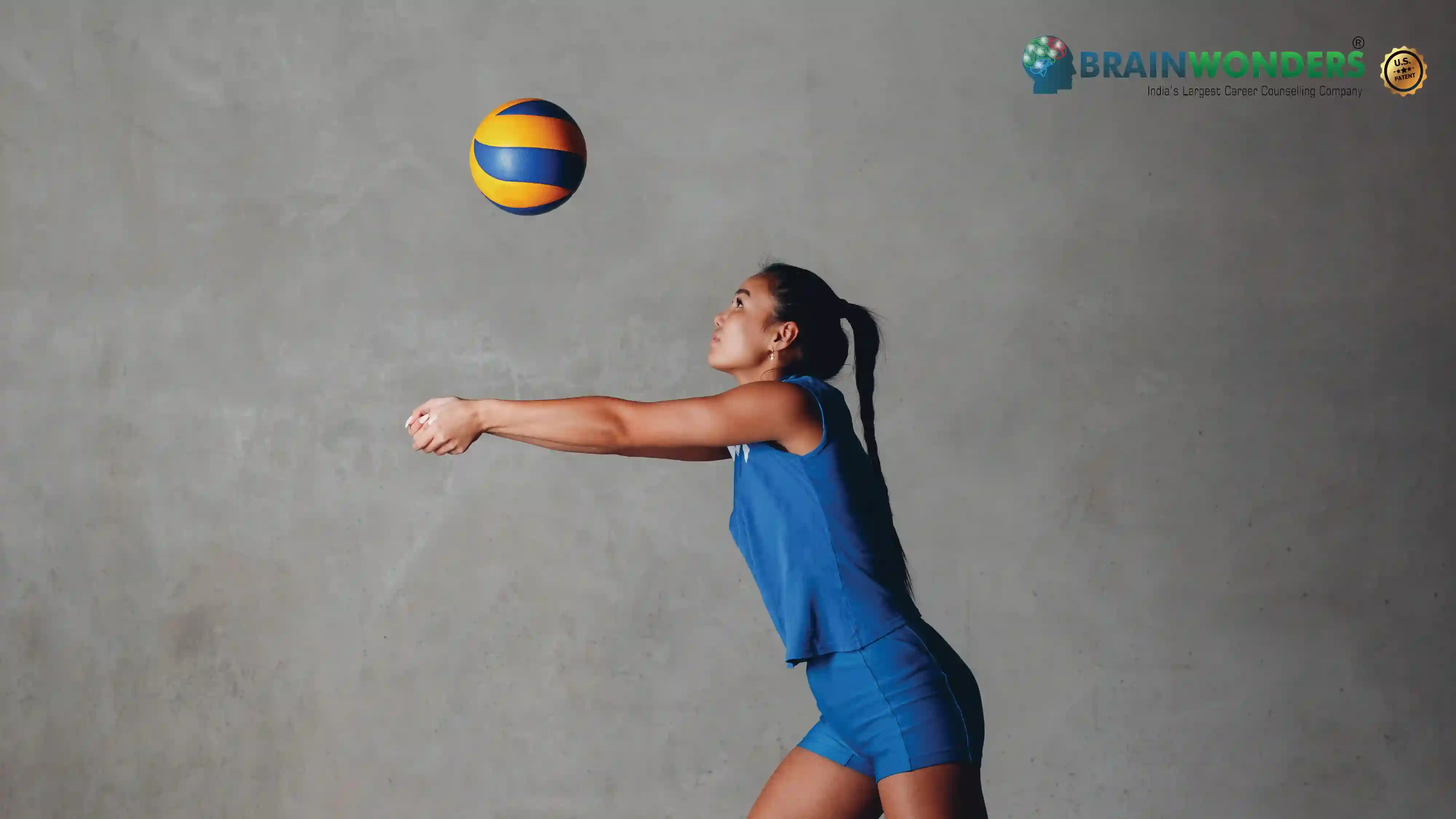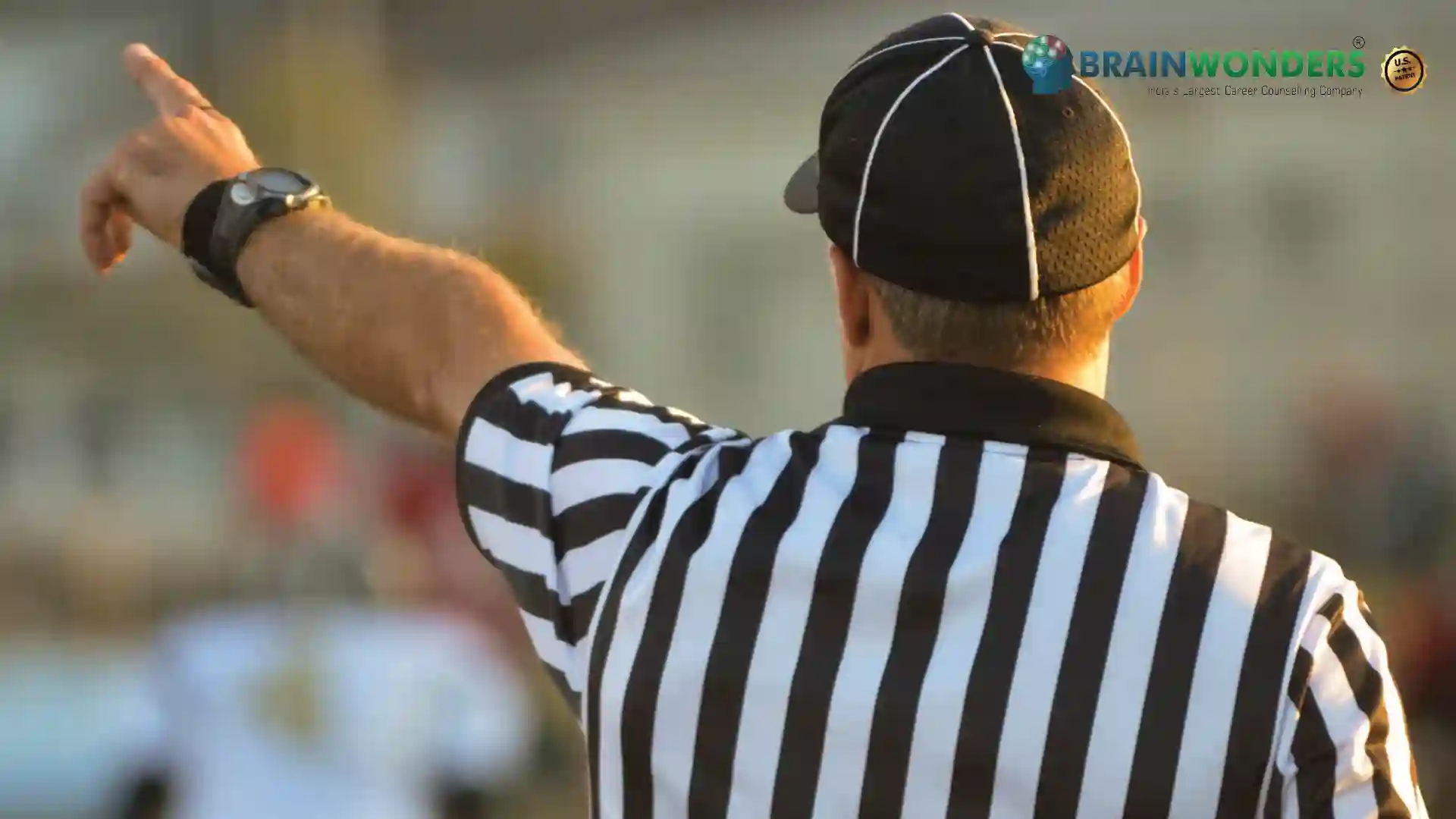How to become a Volley Ball Player
Overview, Courses, Exam, Colleges, Pathways, Salary

Overview
Who is Volley Ball Player ?
A volleyball player is an athlete who participates in the sport of volleyball. Volleyball is a team sport involving two teams of six players, aiming to score points by grounding the ball on the opponent's side of the court while preventing the opposing team from doing the same. A volleyball player possesses a unique set of skills and attributes. They must have excellent hand-eye coordination, agility, speed, and jumping ability. They must be proficient in various techniques such as serving, passing, setting, attacking, and blocking. Volleyball players must also possess good communication skills and teamwork abilities, as the sport heavily relies on coordination and cooperation among teammates.
Volleyball players compete in various settings, including indoor and beach volleyball. They participate in leagues, tournaments, and international competitions, representing their teams or countries. The sport demands physical fitness, mental focus, and the ability to adapt to different game situations.
Volleyball players contribute to the exciting and fast-paced nature of the sport, showcasing their skills through powerful spikes, precise passes, strategic plays, and athletic dives. They engage in continuous training, practice sessions, and conditioning to improve their skills, strength, and overall performance.
Typical day at work
What does Volley Ball Player do?
Volleyball players engage in various activities and responsibilities related to their sports participation. Here are some key things that volleyball players do:
- Training and Conditioning: Volleyball players undergo regular training sessions to develop their skills, physical fitness, and teamwork abilities. They practice serving, passing, setting, attacking, blocking, and defensive maneuvers. They also improve their agility, speed, jumping, and strength through conditioning exercises and drills.
- Competing in Matches: Volleyball players participate in matches and tournaments, representing their teams or countries. They compete against other teams, aiming to score points by effectively using their skills and teamwork to outperform their opponents. During matches, players must execute various techniques, follow game strategies, and adapt to different game situations.
- Teamwork and Communication: Volleyball is a team sport, and players must work collaboratively with their teammates. They communicate on the court, coordinate plays, provide support, and effectively pass information to ensure smooth gameplay. Building strong team dynamics and trust is crucial for successful performances.
- Individual Skill Development: Volleyball players continuously work on improving their skills. They strive to enhance their serving accuracy, passing consistency, setting precision, attacking power, blocking timing, and defensive capabilities. They often engage in individual practice sessions and seek coach feedback to refine their techniques.
- Physical and Mental Preparation: Volleyball players prioritize physical fitness and maintain a healthy lifestyle. They engage in strength and conditioning exercises, flexibility training, and cardiovascular workouts to enhance their athletic performance. They also focus on mental preparation, practicing visualization techniques, managing game-day pressure, and maintaining a positive mindset.
- Analyzing and Studying Opponents: Volleyball players analyze opponents' strategies, strengths, and weaknesses. They study game footage, scout opponents, and strategize ways to exploit weaknesses and counter the opponents' plays. It involves understanding the game plans, identifying patterns, and making informed decisions during matches.
- Sportsmanship and Fair Play: Volleyball players adhere to fair play and sportsmanship principles. They respect the rules, officials, opponents, and teammates. They exhibit good sportsmanship by acknowledging opponents' successes, showing respect, and maintaining a positive attitude throughout matches.
- Continuous Learning and Development: Volleyball players aim for constant improvement and growth. They seek feedback from coaches, participate in training camps, attend workshops, and study the sport to expand their knowledge and skills. They stay up-to-date with rule changes, new techniques, and sports advancements.
Abilities and Aptitude needed
What are the skills, abilities & aptitude needed to become Volley Ball Player?
You must possess the sort of drive and commitment that makes competing at the highest level more important to you than making the most money. You need to have a deep passion for the game and have the sort of perseverance and determination to go through all the pressures, downs, and stresses of playing skillfully. Volleyball players should be highly concentrated when playing and avoid distractions from spectators and opponents. The disparity between losing and winning may sometimes be a consequence of a momentary attention loss. In volleyball, the need to estimate and strike a fast-moving ball depends heavily on the hand-eye coordination of the athlete.
Exercising smart is just as important, if not more important than intense workouts. You do what the coach wants the team to do team exercises, but not what you require to practice as an individual player. Every player has a unique combination of skills, which is why practicing on your own or in small groups is critical in order to improve your deficiencies and strengthen your strengths. Take on your volleyball career match-by-match. Each game you play, concentrate on playing well and putting in your 110 percent because you never know who will watch. Make sure you have solid relationships with your coaches, teammates, and club personnel since their off-field support may help you achieve good on-field performance. It is not immediately that you become a professional volleyball player. This takes years of commitment. It calls for time and patience.
Pathways
How to become an Volley Ball Player?
Entrance Exam
Entrance Exam for Volley Ball Player ?
Courses
Which course I can pursue?
Best Colleges
Which are the best colleges to attend to become an Volley Ball Player?
Industries
Which Industries are open for Volley Ball Player?
Volleyball players primarily find opportunities within the sports industry, specifically in professional volleyball. However, there are also related industries where volleyball players can explore career avenues. Here are some industries that are open for volleyball players:
- Professional Volleyball: The professional volleyball industry offers opportunities for skilled players to compete at the highest level. It includes playing for national teams, clubs, and leagues worldwide, such as FIVB (International Volleyball Federation) competitions, domestic leagues, and international tournaments.
- Sports Apparel and Equipment Companies: Volleyball players can work with sports apparel and equipment companies as brand ambassadors, endorsing and promoting volleyball-specific products. They may participate in marketing campaigns and product launches and represent the brand at events and tournaments.
- Coaching and Training: Experienced volleyball players can pursue careers in coaching and training. They can work as coaches at various levels, including youth programs, club teams, and national teams, sharing their knowledge and skills and mentoring aspiring volleyball players.
- Sports Media and Broadcasting: Volleyball players can transition into sports media and broadcasting careers. They can become analysts, commentators, or experts providing insights and commentary during volleyball broadcasts, interviews, and sports-related media coverage.
- Sports Event Management: Volleyball players can explore opportunities in event management companies that specialize in organizing volleyball tournaments, championships, and other sporting events. They can contribute to event planning, logistics, marketing, and operations.
- Sports Marketing and Sponsorship: Volleyball players with a strong presence and personal brand can work in sports marketing agencies or sponsorship management companies. They can collaborate with brands, negotiate sponsorship deals, and manage relationships between athletes and sponsors.
- Health and Fitness: Volleyball players can pursue careers in the health and fitness industry. They can work as fitness trainers, sports performance specialists, or physical education instructors, utilizing their knowledge of volleyball-specific training and conditioning techniques.
- Education and Academia: Volleyball players may choose to work in educational institutions, teaching and coaching volleyball at the school or collegiate level. They can contribute to the development of youth players, organize training programs, and mentor aspiring athletes.
internship
Are there internships available for Volley Ball Player?
Internship opportunities tailored explicitly for volleyball players may not be as common as in other fields. However, there can be internships or related programs that aspiring volleyball players can consider to gain valuable experience and further their skills. Here are a few avenues to explore:
- National and Regional Volleyball Associations: National or regional volleyball associations may offer internship programs or training camps for talented players. These programs can provide opportunities to train with experienced coaches, compete in high-level tournaments, and gain exposure to national or international volleyball scenes.
- Volleyball Clubs: Volleyball clubs, especially those at higher levels, may offer internship opportunities for aspiring players. These internships can involve training with the club's professional team, participating in practice sessions, and potentially competing in matches or tournaments.
- Coaching and Development Programs: Organizations focusing on coaching and player development may offer internships for volleyball players interested in pursuing a coaching career. These internships can involve assisting coaches, working with youth teams, and gaining experience in training and development programs.
- Sports Performance and Training Facilities: Interning at sports performance centers or training facilities specializing in volleyball can provide valuable experience. Interns can work with strength and conditioning coaches, sports nutritionists, and sports psychologists, learning about specialized training techniques, injury prevention, and overall athlete development.
- Sports Event Management: Internships in sports event management companies that organize volleyball tournaments, leagues, or championships can offer exposure to the organizational aspects of the sport. Interns can assist in event planning, logistics, marketing, and operations.
- Sports Media and Broadcasting: Interning with sports media outlets, such as television networks, online platforms, or sports publications, can provide exposure to the media side of the volleyball industry. Interns may be able to contribute to content creation, interviews, research, or production aspects of volleyball coverage.
Career outlook
What does the future look like for Volley Ball Player?
The future for volleyball players can be promising, with opportunities for growth, professional development, and international recognition. Here's an overview of the career outlook for volleyball players:
- Professional Volleyball: The professional volleyball industry continues to grow globally, with professional leagues, national teams, and international competitions providing opportunities for talented players. Volleyball players can compete at elite levels, representing their teams or countries in high-profile tournaments and leagues worldwide.
- International Opportunities: Volleyball allows players to participate in international competitions, including continental championships, world cups, and the Olympic Games. These events provide exposure to a global audience and the chance to compete against the best players from different countries.
- Beach Volleyball: Beach volleyball, a variant of the sport played on sand, has gained immense popularity. It offers unique opportunities for players to participate in international beach volleyball tours, such as the FIVB Beach Volleyball World Tour, and potentially compete in the Olympic Games, where beach volleyball is a recognized discipline.
- Professional Contracts and Sponsorships: Talented volleyball players can secure professional contracts with clubs and organizations, providing financial stability and opportunities for career advancement. Successful players may also attract sponsorships from sports brands, apparel companies, and other corporate sponsors.
- Coaching and Mentorship: Experienced volleyball players often transition into coaching roles, sharing their knowledge and expertise with the next generation of athletes. They can work as coaches at various levels, from grassroots programs to national teams, contributing to the development of the sport.
- Sports Broadcasting and Analysis: Volleyball players with strong communication skills and in-depth knowledge of the sport can pursue careers in sports media as commentators, analysts, or experts. They can provide insights, analysis, and commentary during volleyball broadcasts and contribute to sports journalism.
- Sports Diplomacy and Advocacy: Successful volleyball players can become ambassadors for the sport, using their influence to promote volleyball, advocate for sports development, and engage in sports diplomacy initiatives to promote peace and understanding through sports.


.webp)

